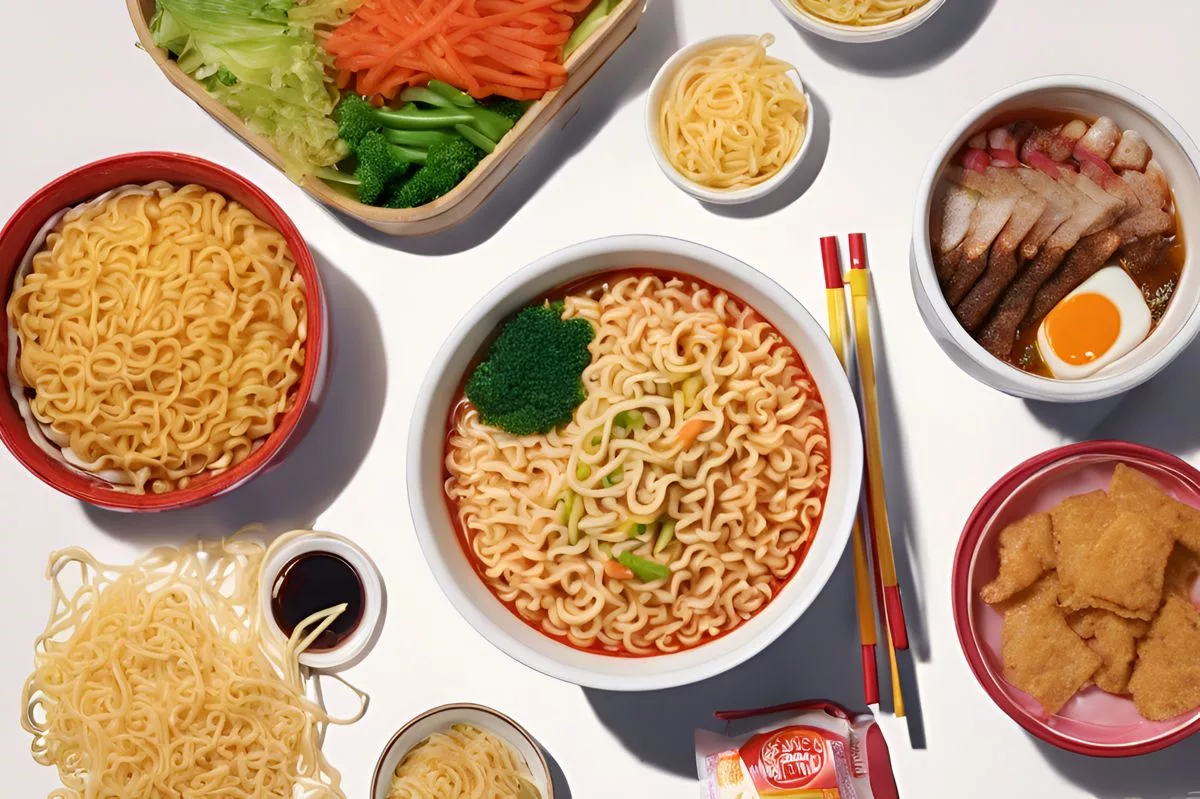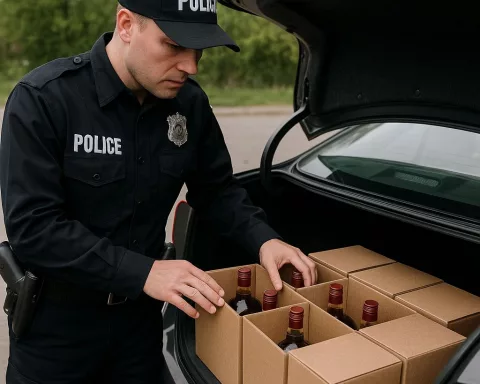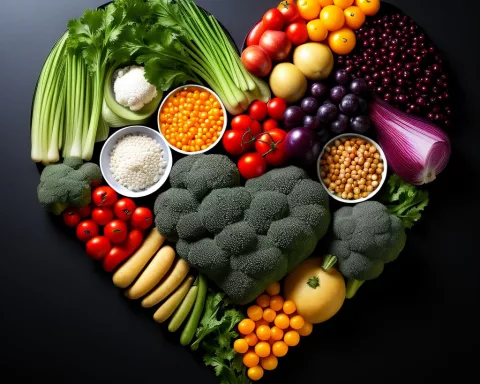Instant noodles and ultra-processed foods, like sugary snacks and ready-made meals, are quick and cheap but come with serious health risks. Eating these foods too often can lead to obesity, diabetes, and heart problems due to their high levels of salt, sugar, and artificial ingredients. In countries like South Africa, the obesity crisis is growing, affecting many people, including children. Experts suggest that better food regulations, public awareness, and healthier eating habits can help fight against these harmful foods, creating a healthier future for everyone.
What are the health risks associated with instant noodles and ultra-processed foods?
Instant noodles and ultra-processed foods pose significant health risks, including obesity, type 2 diabetes, and cardiovascular diseases. These foods are often high in unhealthy ingredients like salt, sugar, and artificial additives, leading to numerous health complications when consumed regularly.
The Rising Popularity and Scrutiny of Instant Noodles
In today’s fast-paced world, instant noodles have secured a unique position as a quick and economical meal solution. They are particularly popular among students, busy professionals, and those on a tight budget. However, the convenience they offer comes with a cost. Increasingly, these humble packets of noodles are coming under scrutiny for their health implications, as recent studies and expert opinions shed light on the dangers of ultra-processed foods (UPFs).
Professor Carlos Augusto Monteiro, a prominent figure in the field of nutrition, emphasizes the mounting evidence against the consumption of UPFs. His research points to the alarming levels of salt, sugar, fats, and artificial additives in these foods, which are linked to numerous health issues. Obesity, type 2 diabetes, cardiovascular diseases, and even certain cancers have all been associated with the regular intake of such highly processed items. Monteiro’s message is clear: governments need to take immediate action to regulate UPFs in order to stem the rising tide of chronic diseases worldwide.
Understanding Ultra-Processed Foods
So, what exactly constitutes an ultra-processed food? These are items that undergo extensive industrial processing and are packed with artificial flavors, emulsifiers, and colorings. Instant noodles are a prime example, but they are not alone; reconstituted meat products and sugary beverages also fall into this category. These foods are often high in calories but low in nutritional value, posing significant health risks to those who consume them.
Rather than getting bogged down by technical definitions, Monteiro suggests that policymakers should focus on regulating foods that are most likely to be ultra-processed. This pragmatic approach could lead to more effective regulations and public health initiatives. The goal is to create an environment where healthier food choices are more accessible and appealing to the general public.
The South African Obesity Crisis
Taking a closer look at South Africa, the nation is facing a severe obesity crisis. The World Health Organization ranks the country among the most obese in the world, and the statistics are alarming. In South Africa, 31% of men and 68% of women are obese, with 13% of children aged 6-14 also affected. The Western Cape presents similarly troubling figures, with around 62.2% of women and 25.1% of men classified as obese.
This public health crisis goes beyond individual choices, reflecting broader systemic issues. Inadequate nutritional education and the absence of stringent food regulations exacerbate the problem. Obesity significantly increases the risk of heart disease, gallstones, diabetes, and high blood pressure. The root causes are complex, involving poor eating habits, sedentary lifestyles, and, in some cases, genetic predispositions.
Proposals for Global Regulation and Lifestyle Changes
Monteiro proposes the establishment of a global convention focused on ultra-processed foods. Such a forum could set international standards and offer national dietary guidelines, specifying which UPFs to avoid. By implementing these measures, countries could take a significant step toward reducing the health risks associated with these foods.
However, regulation alone is not enough. A paradigm shift in lifestyle and dietary habits is also essential. Increasing physical activity, consuming more fiber-rich foods, incorporating vegetables into daily meals, and adopting healthier cooking methods are recommended changes. These lifestyle modifications can have profound impacts on public health, helping to reduce the prevalence of obesity and related diseases.
The Role of Public Awareness and Cultural Context
Public awareness campaigns can also play a crucial role in this fight. Educating people about the health risks of UPFs and promoting healthier alternatives can empower individuals to make better dietary choices. Schools, workplaces, and community centers can serve as pivotal platforms for disseminating this information.
Cultural context is another crucial factor in dietary choices. In many developing countries, traditional diets rich in whole foods are being replaced by Westernized, ultra-processed diets. This shift is often driven by globalization, urbanization, and aggressive marketing by food corporations. Reclaiming traditional dietary practices could be another effective strategy in combating the rise of UPFs.
Creative Approaches and Historical Parallels
Artists and activists are also drawing attention to the issue of ultra-processed foods. Through visual arts, documentaries, and social media campaigns, they highlight the hidden dangers of these convenient but unhealthy options. These creative efforts can complement scientific research and policy initiatives, creating a more holistic approach to public health.
Looking back, there are parallels with other public health challenges, such as tobacco regulation. It took decades of research, advocacy, and legislation to curb the smoking epidemic. Similarly, addressing the issue of ultra-processed foods will require sustained efforts and multifaceted strategies.
Governments can take cues from successful models around the world. Some countries have implemented measures like sugar taxes, front-of-pack labeling, and restrictions on marketing unhealthy foods to children. These initiatives have shown promise in reducing the consumption of harmful foods and improving public health outcomes.
Social Equity and Access to Nutritious Food
The conversation around ultra-processed foods extends beyond individual health to encompass social equity. Low-income communities often have limited access to fresh, whole foods and are disproportionately affected by the negative health impacts of UPFs. Addressing this issue requires policies that ensure equitable access to nutritious food for everyone.
In summary, the debate surrounding instant noodles and ultra-processed foods reflects broader public health and societal issues. Comprehensive strategies that include regulation, education, lifestyle changes, and cultural shifts are needed. By taking a proactive stance, society can mitigate the adverse health effects of these foods and foster a healthier future for all.
FAQ on Instant Noodles and Ultra-Processed Foods
What are instant noodles and ultra-processed foods?
Instant noodles are a type of quick-cooking pasta that is often packaged with flavoring agents and preservatives. Ultra-processed foods are products that undergo extensive industrial processing and contain artificial flavors, colorings, and unhealthy additives. Common examples include sugary snacks, ready-made meals, and reconstituted meat products.
Why are instant noodles and ultra-processed foods considered unhealthy?
These foods are typically high in salt, sugar, unhealthy fats, and artificial ingredients, which can lead to serious health risks. Regular consumption of instant noodles and ultra-processed foods is linked to obesity, type 2 diabetes, cardiovascular diseases, and other health complications.
How is the obesity crisis related to these foods in South Africa?
South Africa faces a severe obesity crisis, with high rates among adults and children. The prevalence of ultra-processed foods in the diet contributes to this issue, exacerbated by inadequate nutritional education and ineffective food regulations. This has led to alarming obesity statistics, placing the country among the most obese in the world.
What measures are being proposed to combat the health risks of ultra-processed foods?
Experts like Professor Carlos Augusto Monteiro advocate for improved food regulations, including the establishment of a global convention on ultra-processed foods. Suggested measures include setting international dietary guidelines, implementing public awareness campaigns, and promoting healthier lifestyle choices such as increased physical activity and consumption of whole foods.
How can public awareness campaigns help in this context?
Public awareness campaigns can educate communities about the health risks associated with ultra-processed foods and encourage healthier alternatives. By utilizing schools, workplaces, and community centers as platforms for information dissemination, these campaigns can empower individuals to make better dietary choices and reclaim traditional eating practices.
What is the role of social equity in addressing the issue of ultra-processed foods?
Social equity is critical because low-income communities often lack access to fresh, nutritious foods and are disproportionately affected by the negative health impacts of ultra-processed foods. Policies that ensure equitable access to healthy food options are essential to mitigate these disparities and promote overall public health.












